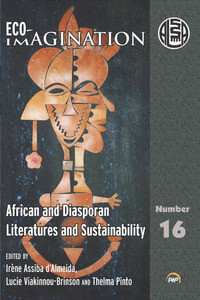Categories
Categories
Authors
Authors
- Home
- Literature/Literary Criticism
- ECO-IMAGINATION: African and Diasporan Literatures and Sustainability, Edited by Irène Assiba dAlmeida, Lucie Viakinnou-Brinson and Thelma Pinto
ECO-IMAGINATION: African and Diasporan Literatures and Sustainability, Edited by Irène Assiba dAlmeida, Lucie Viakinnou-Brinson and Thelma Pinto
ECO-IMAGINATION: African and Diasporan Literatures and Sustainability, Edited by Irène Assiba dAlmeida, Lucie Viakinnou-Brinson and Thelma Pinto
Product Description
Over the years the conveners of the African Literature Association (ALA) annual Conference have organized their conference’s discussions around imaginative and relevant themes which engage the directions of contemporary literary studies. The theme of the 2010 Conference, “Eco-Imagination: African and Diasporan Literatures and Sustainability,” follows this excellent tradition. If the world’s environmental concerns are still mainly a subject for scientists, economists and politicians, there is a growing sense that the Humanities should also address these concerns. Indeed, it should be the work of writers and artists to make sure that ecological opportunities and challenges are known, and to move people to act on that knowledge.
The volume opens with two Keynote addresses. The first was delivered by Ivoirienne poet, novelist, and essayist Tanella Boni, whose extensive and rich work still needs to be translated into English. In “La pollution du monde et le silence des écrivains africains,” (“The Polluting of the World and the Silence of African Writers”), Boni offers a serious challenge, a call for a new sphere of engagement by African writers, an attention to ecological problems that must not be ignored. The second Keynote address, “A la source de l’arbre, l’alternative sculptée: réflexions sur l’art et la durabilité écologique” (“At the Source of the Tree, the Sculpted Alternative: Reflections on Art and Sustainability”) is by Jean-Gilles Quenum, who defines himself as an Afro-European artist. A sculptor who often works with wood, Quenum recognizes acutely the need for conservation, and that awareness has led him to develop an aesthetics of recycling, re-using the material of his sculptures to create different forms.
The majority of the papers and panels in the 2010 convention were concerned with ecology, sustainability, pollution, and how contemporary literary studies address these issues. This volume includes eighteen essays, representative of the conference’s thematic scope and participants’ varying interests. Using the theoretical frame of eco-criticism, eco-poetry and eco-feminism, the essays in English or French have been divided into three general categories on the basis of their subject matter and geographical focus. Part One, titled “The African Environment: Eco-criticism on the Continent” groups essays that examine questions of environmental awareness, degradation of the relationship between nature and human beings, and the impact of global power structures on the environment. The second section, “The World’s Environment: Eco-criticism in the Diaspora” further explores questions of environmental crisis and sustainability as they relate to gender, race, class, consumerism and tourism. The last section, “Other Perspectives:From Translation to Pedagogy” investigates a variety of topics ranging from post/colonial discourse to evangelical translation.
ABOUT THE EDITORS
IRÈNE ASSIBA D’ALMEIDA is a Professor of Francophone Studies and French at the University of Arizona in Tucson. She was the convener of the ALA 2010 Conference.
LUCIE VIAKINNOU-BRINSON is Associate Professor of French and Francophone Literatures at Kennesaw State University in Georgia. She is the founder of “Seeds of Knowledge, Inc.,” a non-profit organization committed to improving literacy in Africa.
THELMA PINTO is a Professor and Co-Director of the Africana Studies Program of Hobart & William Smith (HWS) Colleges in Geneva, New York. She is a Scholar in Residence at HWS.
CATEGORIES
Literature, Literary Criticism/AFRICA
 Loading... Please wait...
Loading... Please wait... 


